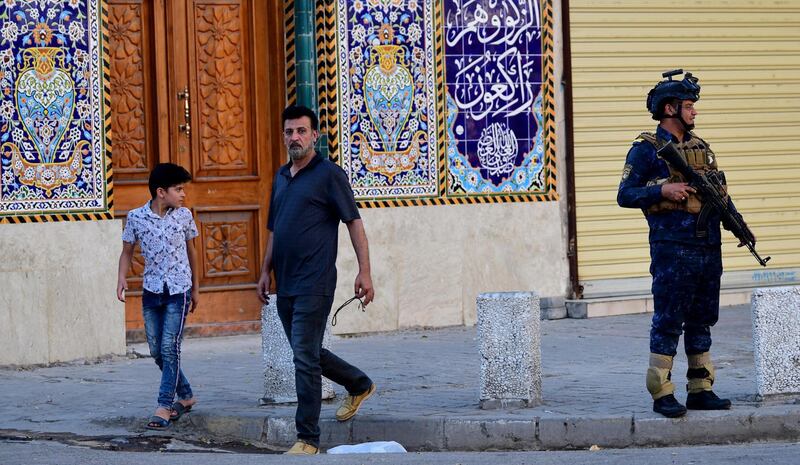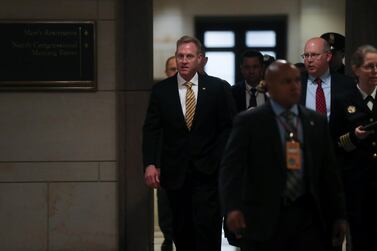The Iraqi capital Baghdad has become a centre of diplomacy aimed at easing tension between the US and Iran, as their rivalry degenerates into threats of military action.
Iraq hosts US troops and is also home to armed groups with close links to Iran, jointly known as the Popular Mobilisation Forces.
This puts it in a precarious position for any fallout between Washington and Tehran, as Iraq tries to recover from a four-year war against ISIS.
“The region will pay a high price. Iraq will pay a high price," Prime Minister Adel Abdul Mahdi said last week. "That’s why Iraq is exerting a lot of effort, so as to prevent a collision."
The latest hostility between two of Iraq’s closest allies threatens a significant setback after months of stability led to a gradual return to normality in the capital.
Concrete barriers and checkpoints are being removed as foreign dignitaries and investors flock to Baghdad, raising hopes that Iraq is finally beginning to turn a page after decades of almost continuous conflict.
But while Iraq has much to lose from a conflict, it may also be in a unique position to mediate between the US and Iran, both of whom see it as an important partner to further their regional interests.
The two countries played a crucial role in helping Iraq to defeat ISIS. The US has substantial investment in Iraq’s oil sector, while Iran provides a lifeline of electricity and consumer goods.
Iraq’s government has so far resisted pressure to take sides, emerging as an unofficial intermediary.
“We are trying to find common ground, trying to convince everybody involved that further escalation will not be helpful to resolving this tension,” an Iraqi government official said.
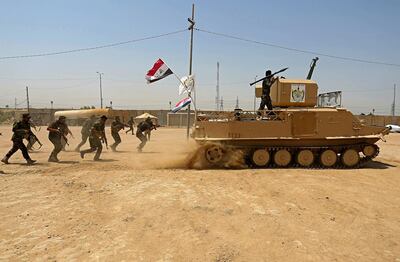
“Given that we have close friendships with both sides, we are able to predict how the other side might react to a certain position or gesture.”
On Tuesday, Mr Abdul Mahdi said Iraq would send delegations to Washington and Tehran to ease the tension, although he said that at this point it was not mediation.
Iraq's internal divisions and lack of an official mandate could also undermine its efforts to get the two powers to step back.
“Even if the government looks neutral, both sides don’t accept neutrality right now,” said Dr Mohammed Radhi, a professor of political science at Nahrain University in Baghdad.
“Each side has its own justifications why Iraq should support them.”
Rifts between the US and Iran began to deepen when President Donald Trump withdrew from a 2015 nuclear deal between Tehran and global powers, reinstating wide-ranging sanctions and labelling the Iranian Revolutionary Guard Corps as a terror organization.
Washington has pressured the Iraqi government to fall in line with its new policy towards Tehran, demanding it wean itself off Iranian gas and rein in the militias, requests that some Iraqis believe interfere in internal matters.
Iran has sought to deepen its political and economic ties with Iraq.
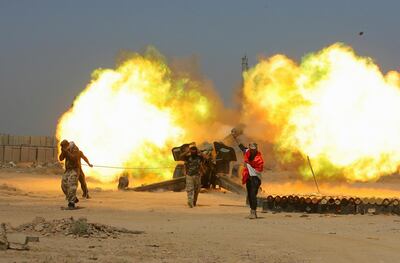
Tensions further escalated this month after US officials claimed that Iranian-backed groups were planning attacks on US interests in Iraq.
It increased its military presence in the region and took the unusual step of withdrawing non-essential diplomatic staff.
These acts have bewildered the Iraqi government and America’s western allies in Baghdad, whose said their own intelligence did not point towards any new threats against US interests.
“They [the US] say they have evidence that a green light was given to Iranian proxies to attack, but at the same time they say 'We don’t know where, when and how it can happen, and we cannot share this intelligence even with our closest allies',” a western diplomat said.
French, German and British diplomats have worked alongside Iraqi officials to deliver messages of restraint.
To ease US fears, the Iraqi government has provided more security for buildings with US military and diplomatic personnel, while also conveying warnings to Iranian-backed groups that any attack on US interests would not be tolerated.
But the government admits that it does not have full control over some of the more unruly elements of the militias.
On Sunday night, a rocket was fired into Baghdad’s secured Green Zone, landing less than a kilometre from the US embassy.
Such attacks are not new but in light of heightened tension, officials in Baghdad fear that even the slightest provocation may unleash an unpredictable response from the US.
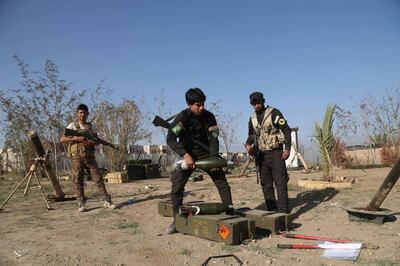
In an unusual show of restraint, some of the militias' hardliners have spoken out against war after Sunday's attack, a sign that attempts to reduce tension could be working.
Qais Khazali, the leader of Asaib Ahl al Haq, tweeted that the attack on the Green Zone was "unjustified, its timing is inappropriate and it does not serve the public interest".
Mr Al Haq earned a spot on the US list of terrorist organisations for attacking American troops after the 2003 invasion, but its political wing gained 16 parliamentary seats in the latest election, which may have led the group to soften its stance.
Kataib Al Hezbollah, another US-designated terror group, also denounced Sunday's rocket attack.
The Popular Mobilisation Forces may be holding their fire for now but there are also concerns that ISIS could exploit the standoff to regain a foothold in Iraq.
Although defeated as a territorial entity, the group has endured as an insurgency that has continued its attacks and raids.
It could stage an attack on US or Iranian-backed forces in a bid to provoke a military confrontation, driving a wedge between the US-led coalition to fight ISIS.
"If there's real military escalation and US forces are hit here, the coalition would be dragged into another conflict," the western diplomat said.
While coalition partners are not obliged to react to an attack on US forces, distancing themselves could “affect the solidarity of the coalition” in its fight against ISIS.
In an apparent first step towards de-escalation, Iranian and US leaders have reaffirmed that they do not want war, but neither appears ready to sit down and talk without prior concessions.
Meanwhile, Iraq’s government is ready to play an active role to avoid becoming the battleground for yet another conflict.
“We believe that Iraq can play a significant stabilising role in the region and the region is ready for Iraq to play that role,” the government official said.
